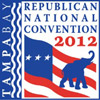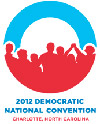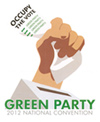With the advent of television and the widespread adoption of primaries, the national parties' nominating conventions have largely been reduced from decision-making bodies to a rubber stamp function. The conventions are, in fact, tightly scripted made-for-TV spectacles. Nonetheless, these quadrennial gatherings still fulfill a vital function in the life of the political parties and can provide a boost for the nominee.
Interest Groups ProtestsAtmosphericsEconomic Impact
Third PartiesRecent ConventionsResources
The Changing Character of Conventions
In the past, the national convention served as a decision-making body, actually determining the party's nominee. For example, the 1924 Democratic National Convention in New York lasted 17 days and required 103 ballots to select John Davis as the nominee. The last Democratic Convention to go beyond one ballot occurred in 1952, when Adlai Stevenson won on the third ballot; the 1948 Republican Convention went to a third ballot before New York Governor Thomas E. Dewey won the nomination. Republicans had a close vote in 1976 in Kansas City when President Ford prevailed over Ronald Reagan by 1,187 votes to 1,070 votes.
Two significant changes
have
occurred in recent decades. First, most of the national
convention
delegates are now selected by voters in primary contests rather than by
party caucuses and meetings. Second, with the advent of
television,
conventions
have become tightly scripted made-for-TV spectacles. Each party
seeks
to present itself in the best possible light and to demonstrate a
united
front rather than to hash out its differences.
(Additionally, in terms of timing, the most recent conventions have
been held in late August and early September, whereas in past decades
conventions in mid-July to mid-August were common. With the
earlier dates, planners had to take into account the Olympic Games,
which in 2012 will be held in London from July 27-August 12. In
any event, later conventions make for a shorter fall campaign).
One could argue that modern day conventions are little more than four-day advertisements for the political parties. Because there is no longer much suspense, conventions have suffered declining viewership, coverage by the major networks has been cut, and some observers have suggested that the conventions themselves should be cut to three days.
The conventions may have been reduced to rubber stamps, but they still fulfill a vital function in the life of the political parties. In many ways, the essence of a convention is what happens off of the convention floor. In the lead-up to the convention, the drafting of the party platform provides interests aligned with the party a forum to present their concerns. During the days of the convention itself, hundreds of events, caucuses, receptions, breakfasts, fundraisers, and parties take place in the hotels surrounding the convention hall. At the end of the convention, party activists return to their communities energized for the fall campaign and, if all goes well, the presidential ticket emerges with a "convention bounce."
Both parties conduct
lengthy site
selection
processes to determine which cities will host their
conventions. Republicans selected Tampa-St. Petersburg,
FL after also considering Phoenix, AZ and Salt Lake City, UT.
Democrats selected Charlotte,
NC after also considering Cleveland, OH,
Minneapolis,
MN, and St.
Louis,
MO.
Once the host city has been selected, the convention
committee starts work on the details of how to meet housing,
transportation, security needs of more than 40,000 people.
(Republicans have a Committee on Arrangements and Democrats have a
Democratic National Convention Committee). The major party
conventions
are funded in part by grants from the Presidential Election Campaign
Fund (the
$3 income tax check-off). The grants, set out in
the Federal Election
Campaign
Act, started at $2.2 million back in 1976 and were increased a couple
of times in addition to being adjusted for cost-of-living
increases. To prepare their 2012
conventions,
the Democrats and Republicans each received grants of about $17.7
million from the Treasury (+).
In addition the host cities of Tampa and Charlotte each received
$50 million federal grants for security (+).
Recent Democratic and Republican conventions have been designated as National Special Security Events, meaning that the U.S. Secret Service takes the lead role in assuring the safety and security of convention-goers. The effort is complex and involves months of planning and dozens of entities and agencies.
As important as the
party convention committees are host committees. [11
CFR
9008.52]. These non-partisan, non-profit committees fulfill a
range of functions. Early on
they promote the city's bid. If
the city is successful, the host committee sets to work raising money
and
in-kind contributions, recruiting volunteers and organizing events and
activities to welcome delegates and media. Corporate
contributions
to host committees and "municipal funds" have comprised an increasing
share
of spending on conventions, leading for some to call for stricter
regulations. The Campaign Finance Institute has argued that
"policies
of the Internal Revenue Service (IRS) and Federal Election Commission
(FEC)
on 'host committee' fundraising are seriously outmoded" and provide a
loophole for tens of millions of dollars of "soft
money
contributions to party-produced extravaganzas."
The 2012 Tampa Bay Host Committee reported contributions of $55.6
million; these included 19 contributions of $1 million or more topped
by $5 million from Las Vegas Sands Corp. CEO Sheldon Adelson, $3
million from local Marketing Solution Publications and $2 million from
the America Petroleum Institute. The committee made disbursements
of $53.2 million.
The Charlotte DNC Host Committee had a more difficult task because
it agreed to somewhat restrictive rules on contributions; it raised
contributions totaling only
$24.5 million (including an in-kind total of $1.3 million from Duke
Energy Corporation, and $500,000 contributions from the
SEIU and from the Fred Eychaner Charitable Fund);
the committee thus took on $13.0 million in loans. The committee
made disbursements of $32.9 million. [FEC: Tampa |
Charlotte]
The platform outlines the party's philosophy and priorities and is prepared in advance of the convention. Truth be told, party platforms are not widely read documents, but the process of writing a platform affords the party the opportunity to publicly seek input from its various constituencies. During platform discussions some points of contention do arise, such as the Republican Party's quadrennial battle over its abortion plank, but generally any major dissension is ironed out before the platform reaches the convention.
Interest groups work on many different levels. Before the convention starts, interest groups weigh in on the party platform. During the convention, groups organize receptions, forums, caucuses and meetings; some set up hospitality suites. Also on hand at the convention is the opposing party, which generally sets up a communications shop and provides daily briefings and rapid response for reporters. With thousands of media representatives on hand, many groups mobilize and try to get out their messages to a broader audience. There are ad campaigns, special events and other creative efforts, and some groups take to the streets.
Conventions have long attracted an assortment of
demonstrators. One need only recall Chicago in
1968. Nowadays convention planners provide specially designated
protest areas
near the convention halls as venues for various groups to make their
points,
but these are caged in and may not be accessible to convention
attendees, so the action has tended to occur on the streets. Most
protesters are peaceful,
but there are always a few troublemakers with destructive
intentions. In 2000 coordinated mobilizations in Philadelphia and
Los Angeles
during
the conventions drew thousands of activists advocating a range of
progressive
issues; these necessitated major police presences. Shadow
Conventions
were also held in the two cities. In 2004 demonstrators did not
have
much of an impact in Boston, but activists opposed to Bush held sizable
protests in New York. In 2008 Denver saw a range of
relatively
low-key demonstrations, while the protests in Minneapolis-St. Paul did
lead to hundreds of arrests. The peace group Code Pink even
managed to get a few protesters inside the Xcel Center. In 2012
in Tampa a big march occurred on Aug. 27, and
other protests were coordinated under
the
resistRNC banner. Despite
concerns,
there
were
only
two
arrests,
and
delegates
did
not
see
much
of
the
protesters.
In Charlotte some protests were coordinated by the
Coalition to March on Wall Street South.
Each convention city and venue poses a unique set of challenges and creates a distinctive atmosphere. Heading into the convention, the soon-to-be formally nominated candidate announces his (or her) vice presidential running mate and generally does some kind of tour hitting key states. Delegates arrive and activity begins. Being a delegate is an exhilarating but exhausting experience. A successful convention energizes attendees and activists, gets the message out to the broader public, and sends the ticket into the fall campaign with the convention bounce.
In 2008 the first day of the Republican Convention was cancelled due to Hurricane Gustav, and in 2012 the weather intervened again. Tropical Storm Isaac threatened to hit Tampa, and while it ultimately edged away to the West, planners cancelled the program for Monday. This meant that four days of speakers had to be rearranged into three days. Republicans achieved a generally successful convention (+), although the rare unscripted moment of actor Clint Eastwood talking to a chair will linger in many people's memories. Democrats had been hyping a big closing night at Bank of America Stadium, but on Sept. 4, 2012 they announced a move to Time Warner Cable Arena due to severe weather forecasts. Republicans said the move was because Democrats had not been able to get enough participants to fill the stadium; convention planners rejected the charge, but the change did put a bit of a damper on the Democrats' big show. On Thursday night the rain did not materialize.
Despite the infrastructure demands and security challenges, hosting a convention can provide a substantial economic boost to a city. A pre-convention analysis by Jones Lang LaSalle put the total economic impact of the Republican Convention on Tampa conservatively at $153.56 million (+) The Tampa Bay Host Committee said in a post-convention release that the convention's "economic impact to the area is expected to be worth $175 to 200 million," but the Tropical Storm Isaac may have dampened that, and some local businesses reported less activity than expected. A Jan. 2013 report on the Democratic Convention in Charlottee prepared by Tourism Economics found, "$91 million in direct convention-related spending plus $72.6 million in indirect and induced spending, resulting in a total net impact of $163.6 million in increased gross output, also called business sales." [PDF]
While
the
big
networks
have
been
giving
less
coverage
to
major party
conventions
in recent years, they generally have ignored third party conventions
altogether.
Fortunately C-SPAN does cover these gatherings, as they provide one of
the best opportunities to learn about ideas and viewpoints beyond those
of the Democratic and Republican parties.
| REPUBLICAN | DEMOCRATIC | |
| 2012 |
Tampa-St. Petersburg, FL Aug. 27-30 | Charlotte,
NC Sept. 4-6 |
| 2008 | Minneapolis-St. Paul, MN Sept. 1-4 | Denver, CO Aug. 25-28 |
| 2004 | New York, NY Aug. 30-Sept. 2 | Boston, MA July 26-29 |
| 2000 | Philadelphia, PA July 31-Aug. 3 | Los Angeles, CA Aug. 14-17 |
| 1996 | San Diego, CA Aug 12-15 | Chicago, IL Aug. 26-29 |
| 1992 | Houston, TX Aug. 17-20 | New York, NY July 13-16 |
| 1988 | New Orleans, LA Aug. 15-18 | Atlanta, GA July 18-21 |
| 1984 | Dallas, TX | San Francisco, CA |
| 1980 | Detroit, MI | New York, NY |
| 1976 | Kansas City, MO | New York, NY |
| 1972 | Miami Beach, FL | Miami Beach, FL |
| 1968 | Miami Beach, FL | Chicago, IL |
| 1964 | San Francisco, CA | Atlantic City, NJ |
| 1960 | Chicago, IL | Los Angeles, CA |
Resources
DemConWatch
- blog provides news and views about the 2012 elections and the 2012
national conventions.
--. Oct. 2009. NATIONAL
PARTY
CONVENTIONS
1831-2008. Washington, DC: CQ
Press.
"National Party
Conventions 1831-2008
provides focused, detailed, and wide-ranging information on national
party conventions, which have been a key element of the U.S. electoral
process since the early nineteenth century. A comprehension of the
history and evolving structure of the conventions is essential to
understanding how presidential leaders are chosen in the United States.
This
reference presents a thorough examination of U.S. nominating
conventions,
including pre-convention politics, descriptions of the convention
system, and in-depth information on specific conventions and political
parties through the election of Barack Obama in 2008."




